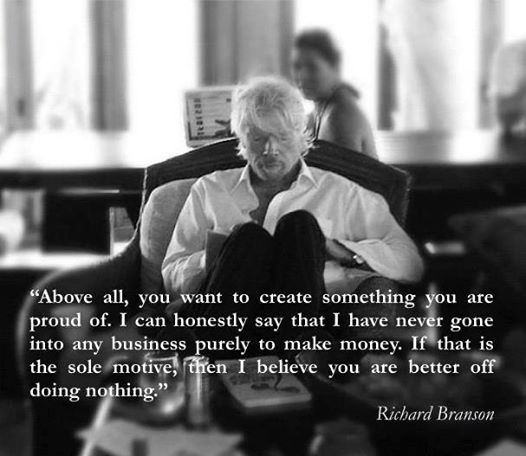
So much of our attention, when we are in business, is focused on making more money. We think, “If only I could make more money. Then I’d be successful.”
This is a faulty belief. We have it the wrong way around. We should think, “If only I were successful. Then I’d have more money.”
Our focus on money actually limits our chances of success.
When we focus on money, we are often concerned with our lack of the stuff. We want more. So, we put our eye on the wrong goal. Sometimes this motivates us to work hard and achieve a target to accumulate the amount of money we need. But what happens then?
If you are like most people, once you achieve that target, you stop doing what you were doing to earn the money and settle back to your comfort zone. Life goes back to normal and so does your income and wealth. That is where most businesses stay.
On the other hand, truly successful entrepreneurs have a different belief.
According to Richard Branson, “Above all, you want to create something you are proud of. That has always been my philosophy of business. I can honestly say that I have never gone into any business purely to make money. If that is the sole motive then I believe you are better off not doing it. A business has to be involving; it has to be fun, and it has to exercise your creative instincts.”

Money only motivates until you have enough to survive on. After that, you need a higher aim.
Most business owners let their dream deteriorate until their purpose for doing business becomes just about the money. When this occurs, the life goes out of the business.
You need to have higher aspirations that are not just focused on money.
There is nothing wrong with making money. I hope you make loads of it. But with money as your only goal, you put a ceiling on your potential, because money only motivates for survival.
To go beyond survival level, you need a higher calling to motivate you.
Anita Roddick, founder of The Body Shop, also had this attitude towards success. She was once quoted to say, “I have always found that my view of success has been iconoclastic: success to me is not about money or status or fame, it’s about finding a livelihood that brings me joy and self-sufficiency and a sense of contributing to the world.”
Truly successful people are driven by more than a motivation for money.
While money is the focus of most of the motivational courses, success and personal development gurus and the myriad of “get-rich-quick” schemes that abound and obviously has a certain attraction for us, it takes more than money to propel a person to the level of success that the entrepreneurs in truly successful businesses have achieved.
Truly successful people have a mission for contribution that inspires them to keep going when the money is enough. But not only that it inspires others to join them on their cause so that ultimately, they can magnify their impact and contribution.
The funny thing about that is that the results are extremely lucrative for the entrepreneur.
If you need a bit of inspiration to rev up your business success, you may enjoy my ebook at https://businessflightpath.com/7-keys called The 7 Keys to Building a Building a Thriving Professional Practice Your Could Sell. Enter the link https://businessflightpath.com/7-keys into your browser to get your free download.

